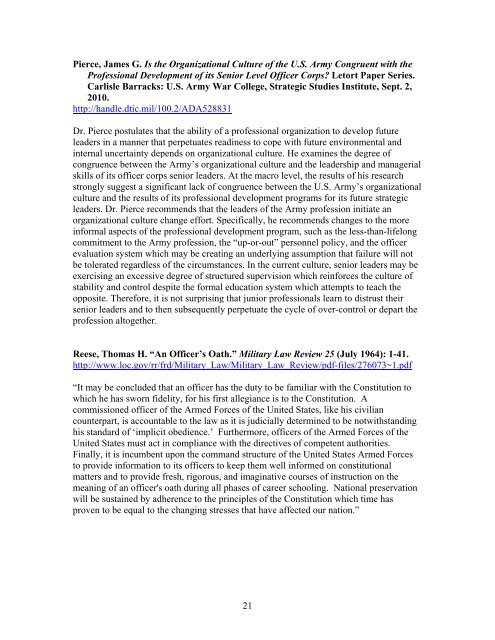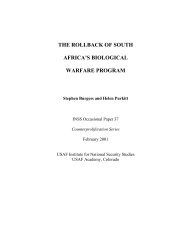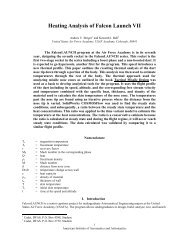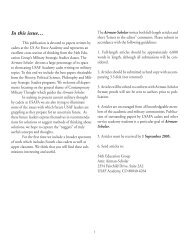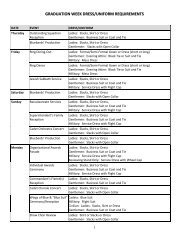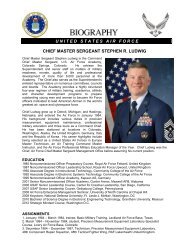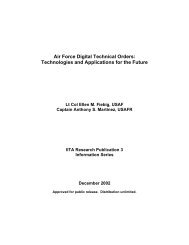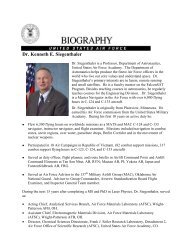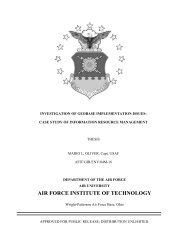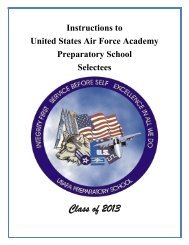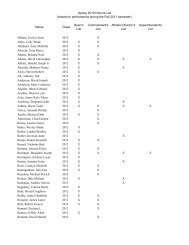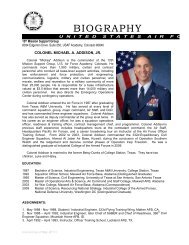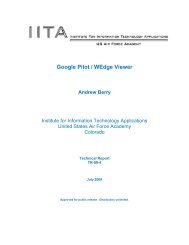Military Professionalism - United States Air Force Academy
Military Professionalism - United States Air Force Academy
Military Professionalism - United States Air Force Academy
You also want an ePaper? Increase the reach of your titles
YUMPU automatically turns print PDFs into web optimized ePapers that Google loves.
Pierce, James G. Is the Organizational Culture of the U.S. Army Congruent with the<br />
Professional Development of its Senior Level Officer Corps? Letort Paper Series.<br />
Carlisle Barracks: U.S. Army War College, Strategic Studies Institute, Sept. 2,<br />
2010.<br />
http://handle.dtic.mil/100.2/ADA528831<br />
Dr. Pierce postulates that the ability of a professional organization to develop future<br />
leaders in a manner that perpetuates readiness to cope with future environmental and<br />
internal uncertainty depends on organizational culture. He examines the degree of<br />
congruence between the Army’s organizational culture and the leadership and managerial<br />
skills of its officer corps senior leaders. At the macro level, the results of his research<br />
strongly suggest a significant lack of congruence between the U.S. Army’s organizational<br />
culture and the results of its professional development programs for its future strategic<br />
leaders. Dr. Pierce recommends that the leaders of the Army profession initiate an<br />
organizational culture change effort. Specifically, he recommends changes to the more<br />
informal aspects of the professional development program, such as the less-than-lifelong<br />
commitment to the Army profession, the “up-or-out” personnel policy, and the officer<br />
evaluation system which may be creating an underlying assumption that failure will not<br />
be tolerated regardless of the circumstances. In the current culture, senior leaders may be<br />
exercising an excessive degree of structured supervision which reinforces the culture of<br />
stability and control despite the formal education system which attempts to teach the<br />
opposite. Therefore, it is not surprising that junior professionals learn to distrust their<br />
senior leaders and to then subsequently perpetuate the cycle of over-control or depart the<br />
profession altogether.<br />
Reese, Thomas H. “An Officer’s Oath.” <strong>Military</strong> Law Review 25 (July 1964): 1-41.<br />
http://www.loc.gov/rr/frd/<strong>Military</strong>_Law/<strong>Military</strong>_Law_Review/pdf-files/276073~1.pdf<br />
“It may be concluded that an officer has the duty to be familiar with the Constitution to<br />
which he has sworn fidelity, for his first allegiance is to the Constitution. A<br />
commissioned officer of the Armed <strong>Force</strong>s of the <strong>United</strong> <strong>States</strong>, like his civilian<br />
counterpart, is accountable to the law as it is judicially determined to be notwithstanding<br />
his standard of ‘implicit obedience.’ Furthermore, officers of the Armed <strong>Force</strong>s of the<br />
<strong>United</strong> <strong>States</strong> must act in compliance with the directives of competent authorities.<br />
Finally, it is incumbent upon the command structure of the <strong>United</strong> <strong>States</strong> Armed <strong>Force</strong>s<br />
to provide information to its officers to keep them well informed on constitutional<br />
matters and to provide fresh, rigorous, and imaginative courses of instruction on the<br />
meaning of an officer's oath during all phases of career schooling. National preservation<br />
will be sustained by adherence to the principles of the Constitution which time has<br />
proven to be equal to the changing stresses that have affected our nation.”<br />
21


